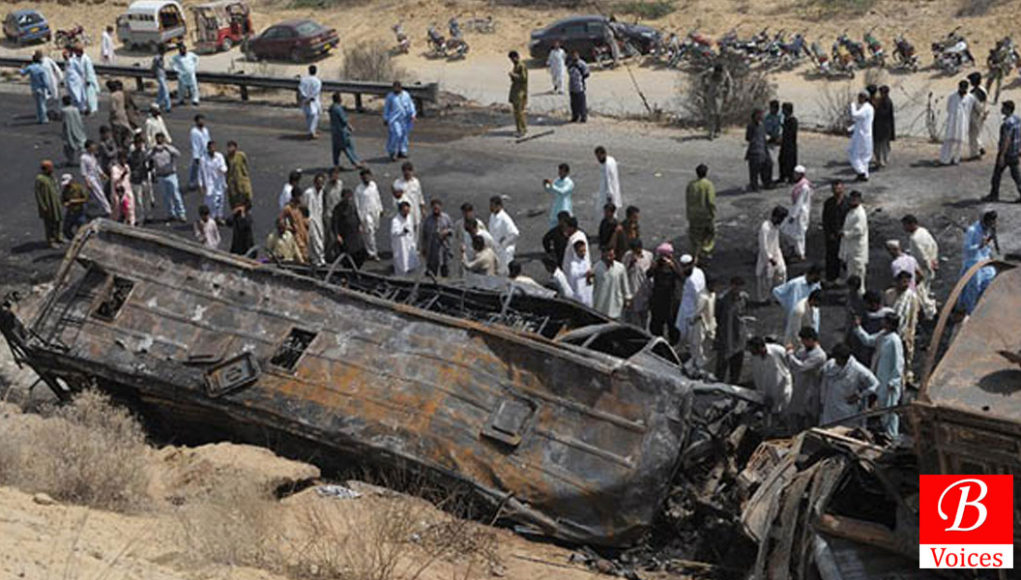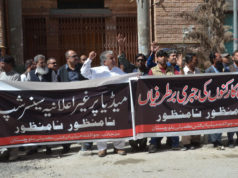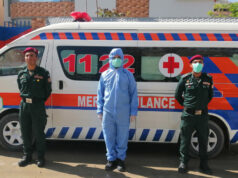Samiullah is a retail shop owner based in Quetta city. In his mid-40s, Samiullah fondly remembers his son Hafeez whom he lost in a traffic accident last year. Hafeez was on his way to Karachi for some business and the bus he was traveling in collided with another vehicle near luckpass. “He died at the spot along with scores of other passengers, I still can’t believe that this happened,” said Samiullah.
Balochistan is a conflict zone which is marred by a low-level ethnic insurgency and also infected by secretariat terrorism. Still, data analysis of highway accidents provided by Pakistan Bureau of Statistics and suicide bomb blasts data by South Asian Terrorism Portal proves that in Balochistan more people die due to highway accidents as compared to suicide blasts.
Highway accidents vs Suicide blasts
According to available data of last 10 years, 488 people lost their lives in 31 suicide bomb blasts in Balochistan. At the same time, 2,238 people lost their lives in 3,797 highway accidents. The data comparison showed that 5 times more people died in highway accidents in Balochistan as compared to suicide bomb blasts.
Jaffar Khan was traveling to Karachi in a passenger bus in early 2017 to meet his relatives. A laborer by profession, Jaffar Khan was the sole breadwinner for his household. The passenger bus he was traveling in collided with a truck carrying marble stones near Uthal town, 160 KM North-west of Karachi. Jaffar Khan was severely injured in the accident but he survived. Later it was discovered that his spinal cord has been severely damaged and He can’t walk. “I did not lose my life in the deadly highway accident but now I have the permanent disability, I can’t work to support my family. The accident effectively took my life away,” lamented Jaffar Khan.
People like Jaffar who get injured in highway accidents are also increasing in number. In last 10 years, 5,613 people got wounded in highway accidents. However, during the same period, only 1,007 people got wounded in suicide blasts. Again, five times more people were wounded in highway accidents as compared to suicide bomb blasts.
Over the course of years, Highway accidents have taken away many precious lives. Dr. Yaseen Baloch, a senior politician and Secretary General of National Party lost his life in a highway accident in November 2015. He was dubbed to be the brain behind the government of former Chief Minister of Balochistan, Dr. Malik Baloch. If he had not lost his life in a highway accident then he would have been a strong candidate for Senate elections of March 2018.
Reasons behind surge in highway accidents
In Pakistan, Highways are policed by National Highways and Motorways Police (NH&MP). However, NH&MP does not have its jurisdiction on all highways of Balochistan. The total length of highways in Balochistan is 4,565 KM and NH&MP only has its jurisdiction over 515 KM length of highways in Balochistan. This means that NH&MP only covers one KM out of every eight KM of highways in Balochistan. Lack of highway patrol and supervision is one of the major causes behind surge in highway accidents in Balochistan.
Secondly, the government does not consider highway accidents to be a matter of priority. It focuses on Law and order and as a result, highway patrolling did not get the required attention and funds. According to data by federal and provincial budgets, NH&MP got annual funding of Rs. 964.02 Million in the fiscal year 2016-17 whereas Law and Order function got funds of Rs. 30.25 billion rupees. Law and order got almost 30 times more funds as compared to highway patrolling and supervision in Balochistan.
NH&MP officials were not available for a comment when contacted by Balochistan Voices.
Third and arguably the most important reason is the narrow width of highways of Balochistan. All highways in Balochistan are single carriageways where there is no divider between both lanes on the highway. The narrow and un-separated lanes on highways of Balochistan are a major contributing factor in causing accidents on highways. Despite the increase in highway accidents and subsequent deaths, Government has not made efforts to widen the highways and convert them into dual carriageways.
Dr. Kaiser Bengali in his latest book A Cry for Justice: Empirical Insights from Balochistan (2018), also states that all highways in Balochistan must be four-lane dual carriageways. He argues in the book that normal formula of traffic-count based analysis can’t be applied to determine the width of highways in Balochistan given the thinly spread population of the province. He also states that National Highway Authority (NHA) should allocate funds for development of highways for Balochistan based on its area which is 44% of total area of Pakistan.
The CPEC Factor
China-Pakistan Economic Corridor (CPEC) is the flagship project of One Belt One Road in Pakistan. This project now worth more than $60 billion amongst other things will also upgrade infrastructure in Pakistan including highways. However, so far CPEC has not benefited highways of Balochistan by widening them and making them dual carriageways. In fact, there are no apparent plans in near future under CPEC which can widen national highways in Balochistan.
Despite the increase in national highway accidents in Balochistan there are absolutely no proper healthcare facilities on highways for emergency medical aid. Accident victims have to be transported to either Quetta or Karachi for medical aid and many passengers lose their lives during the long journeys. In January 2016, Civil Society of Balochistan demanded that Trauma centers should be established on highways of Balochistan to control loss of life in case of highway accidents. However, no action has been take based on their demands.
Emergency Healthcare on Highways
Newly appointed Chief Executive Officer (CEO) of People’s Primary Healthcare Initiative (PPHI), Aziz Jamali, believes that his organization can be of some help. PPHI is an autonomous company which complements government of Balochistan in providing healthcare facilities.
“We [PPHI] felt the need to initiate first aid response considering increasing number of road accidents across Balochistan. 50 out of 650 Basic Health Units (BHUs) of PPHI are located near national highways and we plan to use them for emergency medical aid for highway accident victims,” He told Balochistan Voices. “PPHI intends to post dispensers, and train staff for emergency medical aid so that BHUs are equipped to save lives in aftermath of highway accidents,” he hoped.
Jamali further said that small fleet of 70 ambulances of PPHI along with help of other donor organizations will be used to transport injured passengers to nearby BHUs for medical aid.
The Way Forward
“In a place like Balochistan where Bomb blasts are a common occurrence, I never thought that I would lose my son in a highway accident,” laments Samiullah. Whatever government does it can’t bring back the loved ones of Samiullah and the old days of Jaffar Khan when he could work to support his family? What government can do is to prioritize regulation of traffic on highways and widen the highways so that loss of precious human lives can be prevented in future.
Share your comments!








